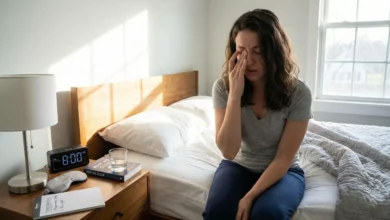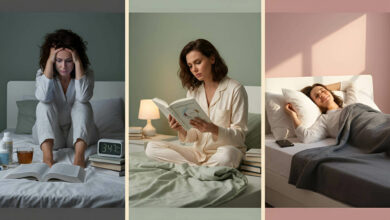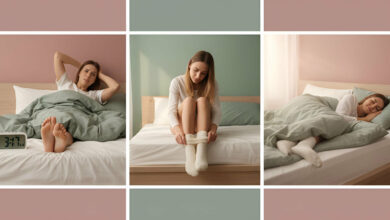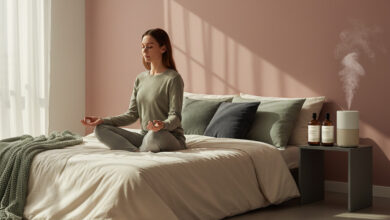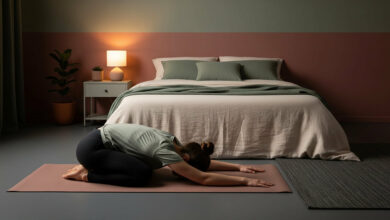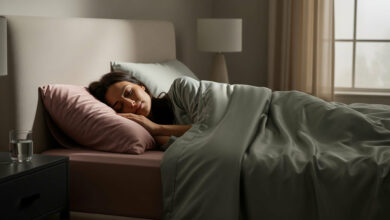Better Sleep
For women in their 30s to 50s, sleep is no longer a simple act of resting; it has become a vital health and beauty necessity that feels increasingly difficult to capture. You likely find yourself staring at the ceiling at 2 AM, with a mind racing through tomorrow’s “to-do” list, or waking up feeling as though you haven’t slept at all. This lack of restorative deep sleep manifests physically—not just as dark circles and a sallow complexion, but as a lingering “brain fog” and a general sense of being off-balance that shadows your entire day.
This struggle is frequently dismissed as a standard side effect of a busy life or simply “hormonal changes” that women must endure. We are often encouraged to sacrifice rest to keep our careers and families running, while the beauty industry suggests expensive night creams as a substitute for actual cellular repair. Because the direct biological link between deep sleep stages, collagen production, and cortisol regulation is rarely the focus of the conversation, the root cause of your physical and mental exhaustion remains unaddressed.
In this section, we move beyond basic “sleep hygiene” to explore the science of the sleep-beauty connection. You will learn how to master your circadian rhythm, understand the impact of blue light on your hormones, and create a nighttime ritual that signals your nervous system to truly power down. We provide the tools to transition from restless nights to the high-quality slumber your body requires to repair your skin, stabilize your mood, and restore your natural glow.
To master the science of rest and unlock the ultimate secret to long-term health and beauty, read the full details here: A Scientific Guide to Better Sleep.
-
Better Sleep 101: The 7 Reasons You’re Tired Even After 8 Hours (and What to Try First)
Table of contentsThe Science of Non-Restorative Sleep: Why Quantity Isn’t Quality7 Biological Disruptors Keeping You Tired1. Poor Sleep Architecture: The Deep Sleep Deficit2. Circadian Misalignment (The Blue Light Effect)3. The Magnesium and Micronutrient Gap4. REM Fragmentation: The Alcohol & Caffeine Paradox5. Thermal Barriers: Why a…
-
How One Small Afternoon Snack Can Unlock a Night of Deep Sleep
Table of contentsThe 3 PM “Sleep Snack”: The Hidden Secret of Your Night RoutineThe Science: Building Your “Sleep Hormones” in AdvanceThe Tryptophan-to-Melatonin PathwayThe “Carbohydrate Key”Why “Afternoon” Timing Is CriticalThe Perfect “Sleep Snack” Formula: What to Eat?Tryptophan-Rich Foods (The Protein)Complex Carbohydrates (The Key)3 Easy “Sleep Snack”…
-
We Introduce the Best Books on the Science of Sleep That Help You Understand Your Body
Table of contentsBeyond “Sleep Hygiene”: A Deeper Dive into the Science of RestThe Sylvaia Reading List: Our Top 3 Books on Sleep Science#1 The Foundational Bible: “Why We Sleep” by Matthew Walker, PhD#2 The Practical Troubleshooting Guide: “The Sleep Solution” by W. Chris Winter, MD#3…
-
Ranking the Best Blue-Light-Blocking Glasses for Evening Use
Table of contentsThe Hidden “Wake-Up” Signal That’s Sabotaging Your SleepThe Science: The Color of the Lens is EverythingThe Ranking: From “Daytime” Lenses to True “Sleep Glasses”#3 The “Digital Eye Strain” Lens: Clear Lenses#2 The “Wind-Down” Lens: Yellow/Amber Lenses#1 The “Maximum Protection” Lens: Red/Orange LensesThe At-a-Glance…
-
Wearing Socks vs. No Socks to Bed: A Comparison for Sleep Quality
Table of contentsThe Great Bedtime Debate: A Matter of Comfort or a Matter of Science?The Science: How Your Feet Act as Your Body’s “Sleep Switch”The Golden Rule of Sleep: Your Core Temperature Must DropThe Paradox: You Must Warm Your Feet to Cool Your CoreThe Verdict:…
-
Do Tryptophan-Rich Foods (Like Turkey) Really Make You Sleepy
Table of contentsThe Great Thanksgiving Myth: The Turkey ComaThe Science: The Tryptophan-to-Sleep PathwayFrom Amino Acid to Sleep HormoneThe Plot Twist: The “Bodyguard” at the Brain’s DoorThe Blood-Brain Barrier is a BouncerThe Carbohydrate “Secret Pass”The Verdict: Don’t Blame the TurkeyThe “Smart Sleeper’s” Snack: The Real Tryptophan…
-
Tested by Sylvaia: The Best Calming Pillow Mists for a Restful Sleep
Table of contentsThe Simple, Aromatic Ritual to Quiet a Racing MindThe Science: How a Simple Scent Can Transform Your SleepIt Calms the Nervous SystemIt Creates a Powerful “Sleep Trigger”The Sylvaia Ranking: Our Top 3 Pillow Mists for Restful Sleep#1 The Cult Classic for Proven Results:…
-
Does Evening Yoga Really Help Calm the Mind and Body for Sleep
Table of contentsThe Struggle to Find the “Off Switch” for a Busy MindThe Science: How Yoga “Downshifts” Your Nervous SystemActivating Your “Rest and Digest” SystemYoga as the Body’s “Brake Pedal”The Perfect Pre-Sleep Yoga Practice: What to Do (and What to AVOID)DO Focus on These Pose…
-
How to Get Better Sleep for Your Health & Beauty: A Scientific Guide
Table of contentsThe Ultimate Beauty Product is Free: Unlocking the Power of SleepYour Body’s Night Shift: The Science Behind “Beauty Sleep”The Repair & Regeneration Cycle: Rebuilding While You RestThe Hormone Connection: Cortisol, Melatonin, and Growth HormoneThe Consequences of Poor Sleep on Your AppearanceThe Ultimate Sleep…
